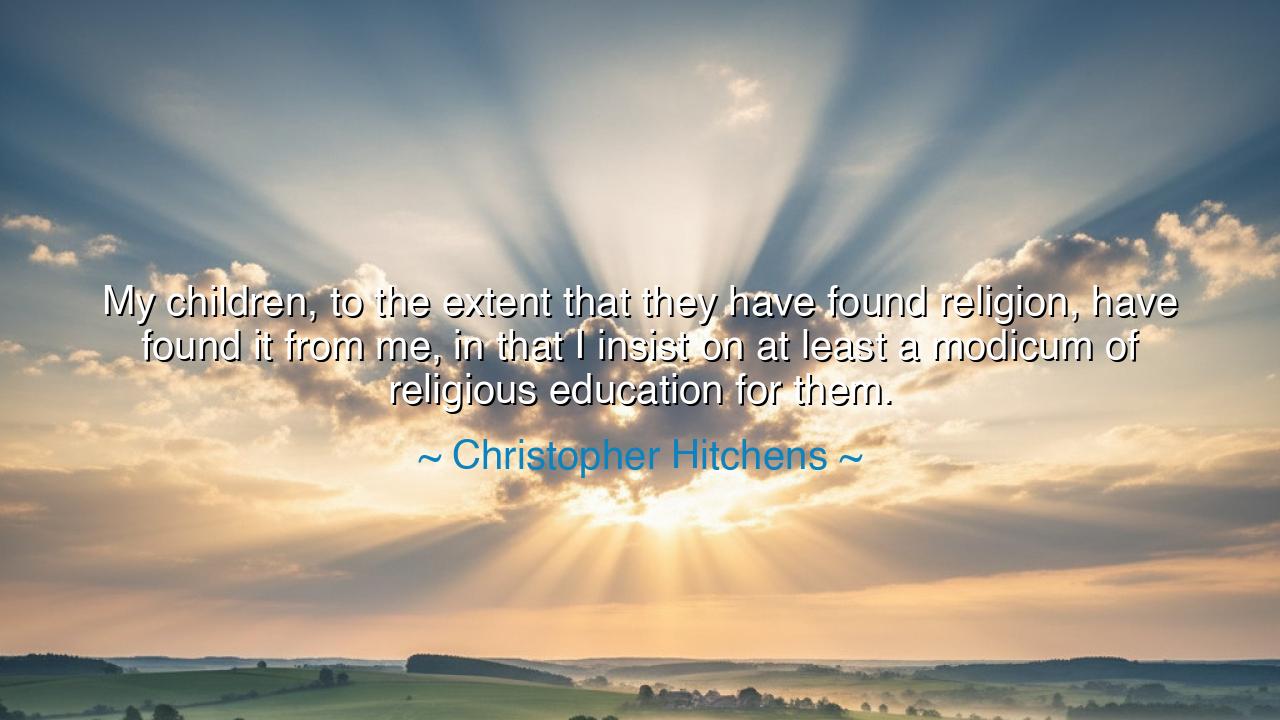
My children, to the extent that they have found religion, have
My children, to the extent that they have found religion, have found it from me, in that I insist on at least a modicum of religious education for them.






The words of Christopher Hitchens — "My children, to the extent that they have found religion, have found it from me, in that I insist on at least a modicum of religious education for them." — are spoken with the candor of a man who lived as both critic and seeker. Though known as a fierce opponent of dogma, Hitchens was also a defender of truth, history, and the inheritance of culture. In this statement, he reveals a paradox both profound and wise: that even in his skepticism, he believed it essential to give his children knowledge of religion, not as indoctrination, but as education. For he understood that to deprive them of it would be to leave them ignorant of the ideas, struggles, and stories that shaped the human journey.
The origin of this thought lies in Hitchens’s lifelong devotion to reason and intellectual freedom. He did not demand that his children accept faith, nor that they reject it. What he demanded was that they encounter it, at least in part, so that their eventual choices would be rooted in knowledge rather than ignorance. His insistence on a modicum of religious education reflects a deeper principle: that dignity of mind requires acquaintance with the forces that shaped civilization, whether one accepts them or not. In this way, his words transcend personal belief and become a universal teaching: to raise a child rightly is not to shield them from the great questions, but to expose them, gently, so they may choose their own path.
History provides us with many examples of this truth. Consider Thomas Jefferson, who, though a critic of organized religion, still studied the Scriptures with rigor, even creating his own edition of the Gospels. He understood that to know religion was to know the roots of Western thought, law, and morality. By engaging with it honestly, he preserved his independence of mind while granting himself the wisdom of history. Likewise, Hitchens’s insistence that his children learn something of religion was not an act of hypocrisy, but of intellectual honesty: to know even what you do not embrace is the path of true freedom.
We may also recall the story of Maimonides, the Jewish philosopher and physician, who encouraged deep study not only of his own tradition but also of philosophy, science, and other faiths. He believed that ignorance was the true enemy of wisdom. So too, Hitchens, though fierce in his opposition to religious authority, would not allow his children to fall into the ignorance of simply rejecting without understanding. In this, his stance is more generous than it first appears — for to give children the tools of knowledge is to honor their autonomy.
The teaching here is clear: whether you are believer or skeptic, you must not close the door of education upon those who follow after you. To withhold the knowledge of religion — or any great system of human thought — is to stunt the growth of the mind. Respect for truth demands that one knows what one accepts or rejects. Thus, Hitchens’s words shine as a paradoxical testimony: even a critic of religion saw the value in passing down at least a portion of its wisdom to his children.
The lesson is this: do not fear the exposure of young minds to ideas, even those you disagree with. Shielding them breeds ignorance; guiding them breeds strength. If you wish them to be free, give them knowledge. If you wish them to have self-respect, let them confront the deepest traditions of humanity and decide for themselves. The parent’s duty is not to dictate belief, but to ensure that the soil of the mind is rich enough for truth to take root.
What, then, should you do? Teach broadly. Let children read the sacred texts, the philosophies, the sciences, the poetry of the ages. Discuss openly. Allow questions to flourish, even uncomfortable ones. Respect their journey, whether it leads them to faith, doubt, or something in between. In doing so, you honor them not only as your children, but as future seekers of truth in their own right.
Thus let this teaching be remembered: to give knowledge is to give freedom, and to give freedom is the highest gift of all. Hitchens’s words remind us that even the skeptic may be a guide to wisdom, and even the critic may insist upon reverence — not for doctrine, but for truth. In this way, his children, and all who follow such counsel, may inherit not only knowledge, but the courage to live authentically, with dignity of mind and integrity of spirit.






AAdministratorAdministrator
Welcome, honored guests. Please leave a comment, we will respond soon